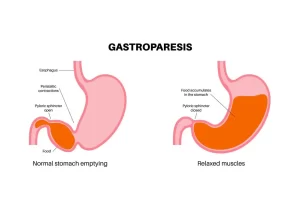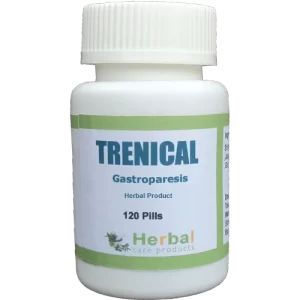Gastroparesis
When stomach motility—the muscles’ natural ability to contract—is disrupted, it’s known as gastroparesis. When the stomach muscles are strong and healthy, they advance the food through the digestive system until it is prepared for bowel movement. Due to reduced or nonexistent motility in gastroparesis, the stomach does not entirely empty. In this approach, gastroparesis obstructs healthy digestion and induces nausea or vomiting.
Natural Gastroparesis Treatment
Gastroparesis, a condition characterized by delayed stomach emptying, can significantly impact quality of life. While traditional medical treatments like medications and dietary modifications are commonly used, many individuals seek natural remedies to manage symptoms. A holistic approach to gastroparesis involves adopting a nutrient-rich, easily digestible diet. Consuming smaller, frequent meals and focusing on low-fiber, low-fat foods can reduce the strain on the digestive system. Soups, smoothies, and pureed vegetables are gentle options that provide necessary nutrients without aggravating symptoms. Additionally, staying hydrated by sipping water throughout the day can further support digestion.
Herbal remedies and supplements have gained popularity as natural treatments for gastroparesis. Ginger, known for its anti-inflammatory properties, can help stimulate stomach contractions and alleviate nausea. Similarly, peppermint oil, often used in aromatherapy or teas, may relax the stomach muscles, easing discomfort. Digestive enzyme supplements can also assist in breaking down food more effectively, promoting smoother digestion. However, it is crucial to consult with a healthcare provider before incorporating natural supplements for gastroparesis, as some may interact with medications or exacerbate symptoms.
Stress management techniques, such as mindfulness meditation, yoga, and acupuncture, play a vital role in natural gastroparesis treatment. Chronic stress can worsen digestive issues, making relaxation practices essential. Acupuncture, in particular, has been shown to stimulate nerve function and improve gastric motility in some individuals. Combining stress management with a tailored diet and gentle herbal remedies creates a comprehensive natural approach to gastroparesis. While these methods may not cure the condition, they can significantly improve symptom management and enhance overall well-being.

Natural Home Remedies for Gastroparesis
Natural remedies for gastroparesis can offer significant relief by supporting digestion and reducing uncomfortable symptoms like bloating, nausea, and early satiety. Incorporating dietary adjustments such as eating smaller, more frequent meals and choosing easily digestible foods can ease the burden on the stomach. Herbal options like ginger and peppermint are known to stimulate gastric motility, helping the stomach empty more efficiently. Gastroparesis Natural Remedies work gently with the body, making them an appealing option for those seeking alternatives to conventional medications.
In addition to herbs and dietary changes, lifestyle adjustments play a key role in gastroparesis natural treatment. Practices such as light physical activity after meals, stress management techniques like yoga or meditation, and avoiding lying down immediately after eating can all improve symptoms. While these home remedies for gastroparesis may not cure the condition, they can enhance quality of life and reduce flare-ups when consistently applied alongside medical guidance.
Although using Herbal Remedies for Gastroparesis can help you manage your symptoms, it’s still crucial that you consult a doctor because untreated gastroparesis can lead to dehydration, malnutrition, fluctuating blood sugar, and other issues that can lower your quality of life in general.
Related Articles: 10 Natural Remedies for Gastroparesis
Yoga
According to research, yoga encourages the liver and pancreas to operate normally, lowering blood sugar levels. Symptoms of gastroparesis may be brought on by an increase or decrease in blood sugar levels.
Exercises that improve breathing and abdominal pumping are helpful for managing gastroparesis. With your eyes closed, focus on your breathing while placing one hand on your tummy and the other on your chest. To get all the air out, inhale gently through the nose and exhale through the same nostrils while pinching the nose and tilting the chin. Breathe more slowly as you pay attention.
Another exercise is to sit on a chair and twist your spine. Maintaining your breathing from the earlier exercise, send one arm back behind the chair and turn to face the rear. Do the same on the other side, then go back to the centre.
Another exercise is to stretch so that your chest is open and stretched out while bringing your arms behind you with your fingers interlocked. No matter what type of yoga you do, make sure to keep your attention on your breath.
Related Articles: Top 8 Diet Tips for Gastroparesis
Aloe Vera
Aloe Vera supports healthy digestion and intestinal regularity. It eases bloating and stomach discomfort and supports healthy digestion as a natural laxative.
Every morning, drink one cup of aloe juice before going to the bathroom. You can make this at home by blending two tablespoons of aloe gel with either one cup of water or orange juice. You can also drink aloe juice before meals. A day’s worth of aloe juice shouldn’t contain more than two teaspoons of aloe gel.
Apple Cider Vinegar
In addition to easing digestive issues including bloating, heartburn, and stomach pain, apple cider vinegar helps to alkalize the body. You only need one teaspoon of apple cider vinegar in a cup of warm water, taken 15 to 20 minutes before a meal. Consuming undiluted apple cider vinegar is not advised as it is excessively acidic and might damage your teeth.
Acupressure and Acupuncture
Both of these fall under the category of alternative medicine for gastroparesis and align the body’s Qi by applying pressure or using needles to trigger places on the body. According to certain research, patients who receive acupuncture or acupressure find alleviation from their digestive issues, such as bloating.
The wrist’s PC6 and the front of the leg’s ST26, both of which have been proved to help with stomach problems, are two crucial body parts to apply pressure to. Prior to receiving acupressure or acupuncture, always see a professional because they are more informed about specific body parts that can help with stomach and digestive problems.
Related Articles: Discover the Top Natural Supplements for Gastroparesis Relief
Diet for Gastroparesis
Diet is yet another important factor that can aid with gastroparesis. Incorporating diet adjustments is crucial in addition to knowing what to eat and what to avoid.
Foods to Eat with a Gastroparesis Diet
You can choose the healthiest things to consume while you have gastroparesis by consulting with a dietitian. Fruits and vegetables in purees and smoothies, canned peaches and pears, well-cooked fruits and vegetables, juices, and soups are examples of common foods.
Consider consuming carbohydrates and starches like white or refined breads, crackers, bagels, pasta, rice, potatoes, sweet potatoes, English muffins, corn tortillas, and puffed wheat and rice cereal. Although fibre is necessary for healthy bowels, you should exercise caution when consuming it as it can also result in constipation and bloating. So it’s recommended to eat low-fiber foods.
Stick to low-fat dairy products like cottage cheese, custard, eggs, ground or pureed meats, low-fat milkshakes, plain yoghurt, and frozen yoghurt, as well as skinless chicken, shellfish, tofu, and tuna in water for your meat, egg, and dairy needs.
Related Articles: Weight loss pills may lead to stomach paralysis, finds new study
Because it includes necessary fatty chains that can help with digestion, coconut oil can be ingested when adhering to a gastroparesis diet.
You can see that eating softer foods is crucial because they are simpler to digest and less taxing on your digestive system.
Foods to Avoid in Gastroparesis Diet
Gastroparesis is a condition where the stomach takes longer than usual to empty its contents into the small intestine. This delayed gastric emptying can lead to uncomfortable symptoms such as nausea, bloating, and heartburn. Managing your diet is one of the most effective ways to alleviate these symptoms. Knowing what foods to avoid can make a significant difference in improving your quality of life.
1. High-Fat Foods
Fat slows gastric emptying, which can worsen gastroparesis symptoms. While some fats are essential for your health, it’s important to limit:
- Fried foods: French fries, fried chicken, and other deep-fried dishes.
- High-fat dairy products: Cream, butter, and full-fat cheese.
- Processed snacks: Chips, cookies, and pastries with high-fat content.
Opt for healthier fats like small portions of avocado or olive oil in moderation.
2. High-Fiber Foods
Fiber, though healthy for many, can be hard to digest for those with gastroparesis. Foods to avoid include:
- Raw vegetables: Broccoli, cauliflower, and carrots.
- Fruits with skin or seeds: Apples, berries, and figs.
- Whole grains: Brown rice, quinoa, and whole-grain bread.
Stick to low-fiber options like peeled and cooked vegetables or white bread to reduce gastric workload.
Related Articles: Gastroparesis Diabetes Treatment: Expert Solutions to Regain Digestive Control
3. Tough Meats and Proteins
Certain proteins can be challenging to digest:
- Red meats: Steaks, hamburgers, and roasts.
- Processed meats: Sausages, salami, and bacon.
Instead, choose tender, lean proteins like fish, chicken, or eggs for easier digestion.
4. Carbonated Beverages
Carbonated drinks, such as sodas and sparkling water, can lead to bloating and worsen discomfort. It’s best to avoid these beverages entirely. Stick to flat, non-caffeinated drinks like herbal teas or water.
5. Spicy and Acidic Foods
Spices and acidic ingredients can irritate the stomach lining and exacerbate symptoms. Avoid:
- Hot spices: Chili powder, cayenne pepper, and spicy sauces.
- Acidic foods: Citrus fruits, tomatoes, and vinegar.
Use mild seasonings like herbs for flavor and avoid acidic ingredients in your meals.
6. Foods High in Sugar
Sugary foods can lead to delayed gastric emptying and rapid blood sugar spikes. Avoid:
- Candy and sweets: Chocolates, gummies, and hard candies.
- Sugary beverages: Sweetened teas, energy drinks, and fruit juices.
Moderate your sugar intake and choose natural, unsweetened alternatives where possible.
7. Nuts, Seeds, and Popcorn
These foods are difficult to digest and may contribute to blockages or discomfort. Avoid:
- Nuts and nut butters: Almonds, peanuts, and chunky peanut butter.
- Seeds: Chia seeds, flaxseeds, and sunflower seeds.
- Popcorn: Even small amounts can cause irritation.
Opt for smooth, seed-free alternatives.





